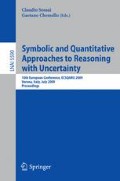Abstract
In this paper we analyze the problem of aggregating different individual argumentation frameworks over a common set of arguments in order to obtain a unique socially justified set of arguments. This can be done in two different ways: a social attack relation is built up from the individual ones, and then is used to produce a set of justified arguments, or this set is directly obtained from the sets of individually justified arguments. Our main concern here is whether these two procedures can coincide or under what conditions this could happen. To deal with this, we consider different voting by quota mechanisms, and the aggregation mechanisms by decisive sets.
Partially supported by SeCyT - Universidad Nacional del Sur, CONICET and ANPCYT.
Access this chapter
Tax calculation will be finalised at checkout
Purchases are for personal use only
Preview
Unable to display preview. Download preview PDF.
References
Arrow, K.J., Sen, A.K., Suzumura, K.: Handbook of Social Choice and Welfare. Elsevier, Amsterdam (2002)
Austen-Smith, D., Banks, J.S.: Positive Political Theory I: Collective Preference. Michigan Studies in Political Analysis. University of Michigan Press, Ann Arbor (2000)
Bench-Capon, T.: Persuasion in practical argument using value-based argumentation frameworks. Journal of Logic and Computation 13(3), 429–448 (2003)
Modgil, S., Bench-Capon, T.: Integrating object and meta-level value based argumentation. In: Besnard, P., Doutre, S., Hunter, A. (eds.) Proc. of Computational Models of Argument, COMMA 2008, Toulouse, France, May 28-30, 2008. Frontiers in Artificial Intelligence and Applications, vol. 172, pp. 240–251. IOS Press, Amsterdam (2008)
Coste-Marquis, S., Devred, C., Konieczny, S., Lagasquie-Schiex, M.C., Marquis, P.: On the merging of Dung’s argumentation systems. Artificial Intelligence 171, 740–753 (2007)
Dung, P.M.: On the acceptability of arguments and its fundamental role in nonmonotonic reasoning, logic programming and n-person games. Artificial Intelligence 77, 321–358 (1995)
Konieczny, S., Pino-Pérez: Propositional belief base merging or how to merge beliefs/goals coming from several sources and some links with social choice theory. European Journal of Operational Research 160, 785–802 (2005)
List, C., Pettit, P.: Aggregating sets of judgments. Two impossibility results compared. Synthese 140, 207–235 (2004)
Modgil, S.: Value based argumentation in hierarchical argumentation frameworks. In: Dunne, P., Bench-Capon, T. (eds.) Proc. of Computational Models of Argument, COMMA 2006, Liverpool, UK, September 11-12. Frontiers in Artificial Intelligence and Applications, vol. 144, pp. 297–308. IOS Press, Amsterdam (2006)
Nurmi, H.: Voting Paradoxes and How to Deal with Them. Springer, Heidelberg (1999)
Pigozzi, G.: Belief merging and the discursive dilemma: An argument-based account to paradoxes of judgment aggregation. Synthese 152, 285–298 (2006)
Rahwan, I., Larson, K.: Mechanism design for abstract argumentation. In: Padgham, L., Parkes, D., Müller, J., Parsons, S. (eds.) Proc. of the 7th International Joint Conference on Autonomous Agents and Multiagent Systems, AAMAS 2008. Estoril, Portugal, May 12-16, vol. 2, pp. 1031–1038. IFAAMAS (2008)
Tohmé, F., Bodanza, G., Simari, G.: Aggregation of attack relations: a Social-Choice theoretical analysis of defeasibility criteria. In: Hartmann, S., Kern-Isberner, G. (eds.) FoIKS 2008. LNCS, vol. 4932, pp. 8–23. Springer, Heidelberg (2008)
Author information
Authors and Affiliations
Editor information
Editors and Affiliations
Rights and permissions
Copyright information
© 2009 Springer-Verlag Berlin Heidelberg
About this paper
Cite this paper
Bodanza, G.A., Auday, M.R. (2009). Social Argument Justification: Some Mechanisms and Conditions for Their Coincidence. In: Sossai, C., Chemello, G. (eds) Symbolic and Quantitative Approaches to Reasoning with Uncertainty. ECSQARU 2009. Lecture Notes in Computer Science(), vol 5590. Springer, Berlin, Heidelberg. https://doi.org/10.1007/978-3-642-02906-6_10
Download citation
DOI: https://doi.org/10.1007/978-3-642-02906-6_10
Publisher Name: Springer, Berlin, Heidelberg
Print ISBN: 978-3-642-02905-9
Online ISBN: 978-3-642-02906-6
eBook Packages: Computer ScienceComputer Science (R0)

